Ü People Welfare & Development
Ü Health & Safety Executive
Ü Roads, Byways and Rights of Way
Ü Legal updates and cases
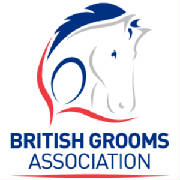 Give your groom a unique gift this Christmas... Give your groom a unique gift this Christmas...
With Christmas just around the corner the British Grooms Association (BGA) is asking
employers to consider treating their staff to a gift that will last them all year long... a membership to their professional
association.
For just £17.50, in addition to being part of an association that supports and
understands the importance of grooms to the industry, members also receive exclusive discounts on a number of things including
personal accident insurance with SEIB, a £10 Derby House discount voucher and the quarterly magazine – British Grooms
which is jam packed with useful tips, advice and stories.
The BGA has been supported by countless top riders who have seen the direct benefits
of their grooms becoming members. British Dressage Olympic rider Richard Davison said “All trades should have their
own professional association in order to raise standards and keep forward thinking and modern. Thank goodness the important
status of grooms is finally beginning to be recognised and the creation of a Grooms Association is central to this.”
Lucy Katan, Executive Director of the BGA said, “We are aware of how employers
are suffering from severe staffing recruitment and retention problems. We desperately want to help the employers by promoting
the job as a groom and so to encourage more young people to consider the career route. It is also crucial for us to offer
support and help to the employer in the areas of staff motivation and retention. We
need our employers to continue to support the association in order for us to continue to provide this much needed help and
so by joining their staff up for Christmas is a great way!”
To join your staff is easy – either call 0845 331 6039 or visit www.britishgrooms.org.uk
UK: Is the credit crunch affecting horse welfare?
Despite the many stories in the media (see below) there is no evidence to suggest that the credit crunch is leading to
large scale horse abandoment or welfare issues in the UK. There is no doubt, as with every other industry, that most sectors
of the horse industry have seen a downturn in activity. However with uncertainty about the economic future, caring owners
are looking at what they can do to reduce costs without compromising their horse's welfare. Find out about some money saving tips from Redwings Horse Sanctuary.
UK: Horse-owners facing tough choices
The economic downturn is hitting Britain's paddocks. Charities say they are getting more calls than ever from owners
who can no longer afford to keep their horses. The Horse Trust says it has received 640 requests to retire animals in the
past month - four times the usual amount.
See also Horses 'victims of credit crunch'
(BBC News – 7 November 2008)
Massachusetts
– USA: Horses victimized by economy »
Horses
are the latest victims of the economy's downward trot. The Massachusetts Society
for the Prevention of Cruelty to Animals has had an influx of horses surrendered to their facility at Nevins Farm. The horses are coming from owners who can no longer afford the expensive animals, said Heather Robertson,
community outreach coordinator at the facility. "They're telling us outright
that they literally cannot afford to care for the animal anymore, or their home has been foreclosed on," she said.
(Eagle
Tribune - 30 November 2008)
UK: Defra launches consultation on animal welfare codes
of practice
Environment Secretary Hilary Benn has launched a consultation
on new codes of practices for cats, dogs and horses, that will offer practical advice on animal ownership.
The codes of practice, which will be published on the Defra
website and in leaflets, will help animal owners to better understand their duties under the Animal Welfare Act 2006.
Launching the consultation, Hilary Benn said: "The Animal Welfare
Act 2006 has been the most important piece of animal legislation for nearly a century. Animals are now afforded greater protection
than ever before. These three new codes of practice will outline the responsibilities of owners under the Act and give practical
advice on how to fulfil them. This means no one will be able to claim ignorance as an excuse for mistreating any animal."
The main purpose of the codes is to provide practical guidance
on animal owners' responsibilities under the Animal Welfare Act. If a person fails to comply with a code of practice
they will not be liable to proceedings of any kind, but failure to comply with several provisions may be used in evidence
to support a prosecution for animal cruelty.
Information in the codes will include practical advice on how
to:
· Create a suitable environment
for your animal to live in;
· Provide a healthy diet;
· Spot signs of stress;
· Protect your animal
from pain, suffering, injury and disease.
Animal owners will also be able to use the codes to find
external sources of information on looking after cats, dogs or horses.
Since its introduction in 2007, the Animal Welfare Act has
helped organisations bring successful prosecutions to people mistreating animals. Under the Animal Welfare Act, anyone convicted
of cruelty to an animal could face a prison sentence or a fine up to £20,000.
Consultation on
the new codes starts on 4 November 2008 and ends on 31 December 2008.
The consultation
documents can be found at the following locations:
Code of Practice
for the Welfare of Equines
http://www.defra.gov.uk/corporate/consult/welfare-equines-cop/index.htm
Code of Practice
for the Welfare of Dogs
http://www.defra.gov.uk/corporate/consult/welfare-dogs-cop/index.htm
Code of Practice
for the Welfare of Cats
http://www.defra.gov.uk/corporate/consult/welfare-cats-cop/index.htm
The Animal Welfare Act was introduced in April 2007. The Act created a duty on anyone responsible for an animal to take all reasonable steps to ensure
that the needs and welfare of the animal are met.
(NDS –
4 November 2008)
UK:
Work horses are vital in alleviating poverty
The Brooke charity aims to tackle the profile of
working horses, ponies and donkeys in developing countries by highlighting their role
(Horse & Hound Online - 2 November 2008)
UK: The Health and Safety Executive’s (HSE) job is to protect people against risks to health or safety arising
out of work activities. They do this through research, information and advice,
promoting training, new or revised regulations and codes of practice, inspection, investigation and enforcement.
HSE launches webpages dedicated to health and safety in Wales
The Health and Safety Executive (HSE) has launched a section of its website
dedicated entirely aimed at providing support and advice to individuals and businesses in Wales on maintaining high standards
of health and safety in workplaces.
Launching the site, HSE Director for Wales Terry Rose said: "We already work
closely with the Welsh Assembly Government, as well as local authorities and a range of other partners in promoting good health
and safety in the workplace in Wales.
"There are clearly many areas of common interest including agriculture, healthcare
and education, and with a different government situation in Wales, it makes sense to adopt a different approach to providing
public information online too."
"This site will allow us to better target online advice and guidance on those
parts of HSE's national strategy that are of particular importance to Wales.
"HSE already provides Welsh language facilities through its public information
call centre, HSE Infoline. The new site is in response to public demand and will allow us to improve our Welsh language provision,
and we are working closely with the Welsh Language Board to ensure this is achieved."
The HSE Wales website gives details of news items, events and advice on protecting against risks to health and safety arising from work activities.
It will be developed further in the coming months.
(HSE) Farmers urged to store feed safely after Northamptonshire farm
death
The HSE is urging farmers and the animal feed industry to reassess risks associated
with feed storage following the death of a young Northamptonshire farmer.
The farmer was killed when a tipping trailer, used for storing animal feed,
overbalanced and crushed him. The sleepers that were used to support the trailer were rotten and collapsed under the weight
of the feed.
Recording a verdict of accidental death, the Northamptonshire Coroner said:
"Farmers should look objectively at the practices that they have adopted over many years. Just because they have been doing
something in a certain way for a long time does not mean it is safe. In other words they should carry out a risk assessment."
HSE Principal Inspector Samantha Peace said: "It is essential that farmers
take on board this advice and take action where necessary. It is important to recognise the dangers of makeshift equipment.
"Purpose made storage bins should be used for storage of animal feed but if
trailers have to be used then they should remain attached to a tractor if the trailer body is raised."
When unhitched trailers are used, HSE advises the following precautions:
· The trailer
should not rely on the hydraulics for continuous support. Suitable props or ram scotches must be used.
· The wheels
need to be chocked as trailer parking brakes are often unreliable and on a twin axle trailer may only brake one axle which
will be ineffective if weight transfers to the rear.
· Stability
- the means to prevent the trailer tipping over backwards should be equally effective as being hitched to a tractor - e.g.
by securing the draw-bar to the ground or providing a counter balance, at the hitching point, equivalent to the weight of
the tractor normally used on that trailer.
· Whatever
the method of storage, it should be inspected regularly for signs of deterioration which could affect the structural integrity.
Any defects must be rectified immediately.
HSE have asked the feed industry to bring this incident to the attention of
farms where they deliver into similar facilities. Using trailers as feed bins creates a real safety risk that needs to be
sensibly managed to prevent harm to farmers, their families and their businesses.
(18/11/2008)
HSE Myth of the month – November 2008
Myth: Children need to be wrapped in cotton
wool to keep them safe
The reality
Health
and safety law is often used as an excuse to stop children taking part in exciting activities, but well-managed risk is good
for them. It engages their imagination, helps them learn and even teaches them to manage risks for themselves in the future.
They won’t understand about risk if they’re wrapped in cotton wool.
Risk
itself won’t damage children, but ill-managed and overprotective actions could!
Go to the HSE’s
Myth of the month homepage
Get free leaflets from the HSE - Clear and simple advice on a range of health and safety issues
UK: The “Safety with Horses” course just got better...
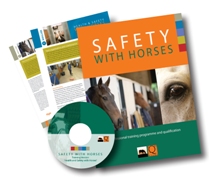
The award-winning "Safety with Horses" course is acknowledged for
setting the standard of safety training across the horse industry. But the course
which can be completed at home and your own stables just got better...
If you join during the current campaign, not only do you stand to make your yard
a safer place for people and horses while achieving a nationally accredited award, but you'll also receive a free ticket to
a top equestrian event, meeting one of our top riders.
By successfully completing the Equi Study “Safety with Horses” home/stable
study course and you will receive a free ticket to one of four top equestrian events including Olympia, Badminton, Burghley
and Horse of the Year Show. You’ll also have the opportunity to meet a leading rider, learn about top level competition
and ask questions about show jumping or eventing.
There are seven start dates during the year so you can choose both your favourite
event and the best time to complete your course.
Anyone who is 16 years and over who has access to horses and equine facilities
can take part. You’ll also need a competent person (Level 3 – e.g. AI)) who can observe you undertaking some basic
but key practical activities with horses. The course fee is £40 and this includes registration fees and all necessary learning
and assessment materials, however if you are between 16 and 18 years old the course is absolutely free. Everyone will be able to access their own Equi Study Tutor to help them complete their course. Click here for more information on the “Safety with Horses” campaign.
Find out what the Health and Safety Executive say about the course
Riding Safely thoroughly recommends
this course
UK: Disaster averted at racehorse charity after fire breaks out
Fast action by staff at Greatwood, a charity that cares for ex-racehorses, averted disaster when a fire broke out. It is thought that the fire was started by a faulty lightbulb, which exploded with
sparks setting fire to the bedding.
(Horse & Hound Online - 6 November 2008)
Wiltshire
– UK: Fake horse brought in to train firefighters »
A
life sized mannequin horse and other specialised equipment has been brought in at a cost of £14,000 to help firefighters train
in animal rescue. The fake horse, which is 15 hands high, has been funded by
the Wiltshire branches of the RSPCA to allow Wiltshire Fire and Rescue Service to practise the specialist techniques used
to save animals that have got into trouble.
(This
is Wiltshire.co.uk - 28 November 2008)
Oxfordshire
– UK: Horse play leads to equine rescue »
A horse had to be rescued by firefighters from a ditch in Stratton Audley on Saturday.
The horse was said to be making a full recovery.
(Oxford
Mail - 30 November 2008)
|
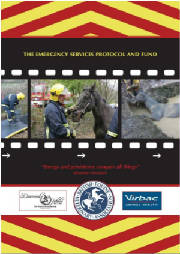
The Emergency Services Protocol
Guidelines to help the emergency services cope better with
equine incidents were launched in May 2007.
The guidelines aim to ensure that any horse involved in
an accident receives proper care as quickly as possible. They cover everything from how a 999 call should be dealt with to
advice on identifying horses and coping with a large animal in an incident.
An Emergency
Services Protocol Fund has also been set up by the BHS and BEVA, to help minimise delays for injured horses receiving veterinary
care when their owners cannot be traced. The fund will also pay for rescue training and specialist lifting and rescue equipment
for the emergency services.
To donate to the fund, contact BEVA (tel: 01638 723555).
Read more from Horse & Hound Online
Download the Emergency Services Protocol leaflet.
|
Stoke-on-Trent
– UK: Horse killed when rear ramp on trailer opened while in transit »
Police would like to speak to anyone who
has suffered a faulty trailer incident after a horse was killed when the ramp of the trailer in which she was travelling fell
down.
(Horse & Hound Online - 19 November 2008)
Readers of the Horse & Hound Forum were quick to respond and the Police
Officer heading the investigation “posted” seeking help:
“Hi all,
I know that this is quite unconventional, but I am the
police officer heading this investigation.
We really need to ensure that this does not happen again to anyone else. I also
have horses and fully understand the feelings and concerns that arise when incidents like this happen.
I am urgently trying
to find other people that have experienced issues with the rear ramp of trailers falling, especially when a collision has
occured as a result.
For obvious reasons, I cannot disclose the make of this trailer until we are further in our investigation.
I
have already spoken with some people that have posted here but really need to see if we have others out there.
If so, it
is vital that you contact me please on 0300 1234455 and ask for myself, PC 827 Kate Hardt from Rugeley police station. Thanks in advance for your help.”
Read all the posts on this subject »
No one likes an accident. Those featured in this section come from media sources and often lack
the detail of the circumstances that may have contributed to the tragic outcomes. Even so, by being aware of the types of
accidents that have happened in the past may help to prevent or lead to action to prevent similar accidents occurring in the
future.
UK: Derbyshire rider who died in fall is named »
An inquest has heard how 43-year-old Loretta Jane Topliss of Swadlincote, Derbyshire, died
after falling from her horse on Saturday 15 November.
(Horse & Hound Online - 20 November 2008)
New York – USA: Woman dies after spooked
horse bolts
Experienced rider Margie Smith has circulated an email detailing the accident
which killed her friend, Patty O’Neal, on 1 November in New York’s Mendon Ponds Park. On the trip
to the park one of the horses in the trailers became distressed, spooking some of the others. To try to settle
hers down, Ms O’Neal mounted him, hoping to ‘ride off’ his fears. She wasn’t wearing a
riding hat. At the same time the original distressed horse, now being ridden, bucked and took off, unseating his
rider and causing the saddle to slip and hang beneath him. In the fracas, Ms O’Neal’s head was smashed
against a low branch, causing her to fall to the ground resulting in extensive injuries from which she couldn’t possibly
recover.
(Riding Safely – 7 November 2008)
Denmark: 14 year old girl dies after fall from horse
TV2 Denmark reports that a 14-year-old girl died on Sunday 3 November after
falling from a horse and landing on her head. The girl was out riding near her home in Assens, on the Danish island
of Fyn. She was still conscious when the ambulance took her to Odense University Hospital, but sadly doctors couldn't
save her and she died of internal bleeding. According to police, she wasn't wearing a riding hat when the accident happened.
(TV2 Denmark - 3 November 2008)
Telford – England – UK: Woman injured loading horse
A woman from north Shropshire was airlifted to hospital on Saturday (8 November) after she was injured loading
a horse. It is believed she was loading a horse into a horsebox when the animal panicked and backed out of the horsebox, falling
on her. The woman was airlifted to the Royal Shrewsbury Hospital but had not suffered serious injuries, and was discharged
with bad bruising.
(Shropshire Star – 10 November
2008)
UK: Huntsman in horrific accident
A hunt follower was horrifically injured when he fell from his horse - and was impaled on the horn of his hunting
whip. Tom Pitman, 38, was riding with the Beaufort Hunt when his horse Winston smashed through a gate and threw him off. He landed on the handle of his whip, which punched a two-and-a-half inch hole into
his back below his shoulder blade. Hunt secretary Nigel Maidment dialled 999 and Tom was airlifted to Frenchay Hospital in
Bristol, where he was kept in overnight and discharged the following day.
(Gazette & Herald – 10 November 2008)
Diss - England – UK: Woman airlifted to hospital after being kicked during clipping
A woman was airlifted to hospital with serious chest injuries on Wednesday after being kicked by a horse.
The 38-year-old was clipping a horse at Hill Farm in Bressingham when it kicked her "square
in the chest".
She suffered broken ribs
and a possible fractured sternum and was taken to the Norfolk and Norwich University Hospital because of its cardio-thorasics
capabilities.
(Diss Express – 5 November 2008)
Auckland - New Zealand: Horse falls on top jockey »
One
of the country's leading female jockeys is thankful to be alive tonight after she was pinned beneath a half-tonne horse in
a freak accident.
Trudy Thornton was
riding at Ellerslie Racecourse when - seconds into the race - her horse suddenly collapsed and died before it even hit the
ground.
(3 News NZ - 30 November 2008)
Nottingham - England - UK: Horse woman's death 'accidental'
An inquest jury has returned a verdict of accidental death in the case of a
Nottinghamshire woman who was kicked in the head by a horse. Lucie Simpson, 20, from Carlton, died in May at the West Bridgford
Equestrian Centre, after helping a vet with a mare and its foal. Nottingham Coroner's Court heard the vet had tried to resuscitate
her but she died from bleeding on the brain.
(BBC News Online – 14 November 2008)
UK:
Broadband ‘not spots’ a risk to North Wales farmers
Broadband “not-spots” are leaving farmers in rural areas
struggling to keep up with the latest government information on diseases such as blue tongue and foot and mouth.
Ministers were told farm staff
in parts of Wales are unable to view up-to-the-minute advice posted on the Department for the Environment, Food and Rural
Affairs website, because they can’t get access to broadband.
Politicians called on Rural Affairs
Minister Huw Irranca-Davies to put pressure on newly-appointed Business Secretary Peter Mandelson to ensure the service is
made available in the most remote and isolated areas.
(Daily Post – 7 November 2008)
Riding Safely adds that having broadband access is equally important for all equestrian related businesses particularly
in the event of an outbreak of an equine notifiable disease.
Beijing - China: China allows horse race gambling 60 years after Mao banned
it »
Mao Zedong abolished organised gambling after the Communist Party acquired
power in 1949. Organised gambling on race horses returned to China on Sunday after a span of nearly 60 years since Mao declared
gambling along with opium as a serious vice that had to be eliminated. The first event of betting of race horses took place
today in Wuhan in Hubei province in central China.
(Times
of India – 30 November 2008)
|
 |
|
|
|
 |
Ü Consultations, Research & Surveys
Ü Looking forward - Diary Dates
Ü Key News Reports of 2008
Get more from Riding Safely
Ü How to get the most from this page
|
|
Check out the latest local, national and international weather forecasts from
the Met Office »
|
|
|
|
|
|
|
|
|
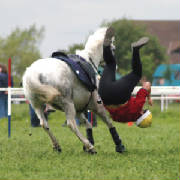
In what is believed to be the first of its kind, an internet-based survey has
been launched to measure the extent and consequences of horse-related injury across the USA, Britain and Australia. The survey
was developed by Dr Patricia Evans at Utah State University, and has been adapted for wider international use with help from
Ken Law, editor of the UK-based website Riding Safely and Denzil O'Brien, who has recently completed a 5-year surveillance
program on risks in eventing. It is being co-hosted by the Equestrian Federation of Australia.
The survey is aimed at anyone who has suffered a horse-related injury and asks
questions across a broad range of equestrian activities and disciplines. Some questions have a distinct USA or UK focus and
should be answered accordingly. The survey should only take a few minutes to complete. “This is possibly the first time
that such a survey has been undertaken across such a wide range of potential respondents, and we believe that it will
provide valuable information on the extent and cost of horse-related injury in our sector.” said Denzil O’Brien.
“We are hoping to obtain richer information than that previously gained through hospitals.”
The survey and data analysis are being undertaken through Utah State University.
Under US law it can only be completed by people aged 18 or over. Anyone taking part will not be asked for identifying information
- data gathered will be used statistically not descriptively.
“We’ve had such surveys in the past but these have normally been
limited to individual countries” said Ken Law “running the survey simultaneously across three countries and gaining
comparable data may prove of enormous benefit in improving safety internationally – I urge everyone to take part”.
Click here to take part in the survey that runs until February 2009.
|
|
|
|
|
Ü UK: (DEFRA) Consultation launched on changes to horse identification
legislation
Defra has launched a consultation
to revise the existing equine identification legislation. The consultation period runs from 10th November 2008 to 10 February
2009.
The main requirement for the new Horse Identification legislation is the compulsory
microchipping of foals born after 1 July 2009. This requirement will not be retrospective for older horses.
Under the current legislation, all equidae are required to have identification.
The new regulation aims to improve this current method of identification by linking each ID issued to an electronic microchip
implanted into the animal. Linking the microchip and ID, which are both recorded as a unique life number on a national database,
will reduce risks to human health by stopping certain animals entering the food chain, help disease surveillance, and aid
recovery of lost or stolen horses.
The purpose of the consultation is to seek views on draft Regulations intended
to apply Commission Regulation (EC) No 504/2008 in England. The consultation document is confined to the application of a
number of derogations provided for in the Regulation, along with new offences created and penalties for non compliance.
The consultation can be found at http://www.defra.gov.uk/corporate/consult/equine-id/index.htm
|
|
|
|
|
|
|
New Zealand: Fireworks spook horse to its death
Fireworks set off next to the Te Atatu Pony Club spooked a horse named Kracker, causing it to bolt and badly wound
itself. The horse was injured so severely that it had to be put down, leaving
its 14-year-old owner devastated.
(TVNZ - 29 October 2008)
|
|
|
|
|
|
|
Ü UK: National Equine Forum - 31
March 2009
The National Equine Forum is a high profile annual event that is held at the
Royal Society in London. The audience includes invited leaders of the various disciplines and interests in the horse world,
and is normally attended by Her Royal Highness the Princess Royal and the Minister for the Horse Industry. There are a small
number of tickets available on a first come first served basis for paying guests at a cost of £100 for the day’s event,
including a buffet lunch. The Forum provides an outstanding opportunity for networking with the leaders of the horse industry,
and represents exceptional value for money for those wishing to engage in continuing professional development.
The 2009 Forum will be held from 0930 to 1600 on Tuesday 31 March. It is a
not-for-profit event that investigates topics of current interest and concern in a non-partisan and non-commercial fashion,
with plenty of time for questions. Topics selected are always relevant and frequently controversial. Expressions of support
in debate at the Forum can often lead to initiatives going forward, as for example with the formation of the British Grooms
Association.
The 2009 Forum will include the following topics:
· Feed, including papers on the impact of biofuels
and world food demand, the advantages and disadvantages of additives, and the risks of accidental doping from cross-contamination
· Whether the equestrian world is hobby, sport, recreation
or industry
· Progress in setting up the British Grooms Association
· The implications of recent Government policies
on developments in work based learning
· A coordinated presentation by the Worshipful Companies
of Saddlers, Loriners and Farriers
· Olympic and Paralympic Games, looking back to performances
in 2008, and forward to the selection of locations in 2012
· Undergraduate thesis of the year
· Topical spot, this year looking at vaccines and
the BEVA laminitis study
If you would like to apply for a ticket, please contact the Hon Secretary,
Mrs Tracy Lepkowska, at Warwickshire College, Moreton Morrell, Warwick, CV35 9BL email TLEPKOWSKA@WARKSCOL.AC.UK
|
|
|
|
|
Ü "In sicknes and
in health"
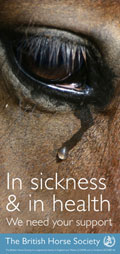
The ‘In sickness and in health’ fundraising campaign is designed
to support the BHS’s work of preventing the suffering of thousands of horses and ponies, which it does by providing
expert advice across a broad range of equine topics.
Read more »
Ü Breaking
the Strangles hold
In February 2007, the Animal Health Trust (AHT) and British Horse Society (BHS)
launched a nationwide Strangles Campaign, which has two aims. The first is to raise awareness of this dreadful equine plague,
and the second is to gain support for the research programme.
For this, the target is to raise £250,000 to fund research into the next stages
of the development of improved means of diagnosis and prevention – ultimately to eradicate this terrible disease.
The campaign was launched by the President of the AHT, HRH The Princess Royal,
at the Royal Society of Medicine in London. It continues to make great progress, with the total raised so far standing at
£159,000.
For more information about Strangles and the campaign visit www.strangles.org
|
|
|
|
|
|
|
Ü January:
Coming
soon...
|
Ü February:
Coming
soon...
|
|
|
|
|
|
|
|
|
|
|
|
|
Ü September:
Coming soon...
|
Ü October:
Coming soon...
|
Ü November:
Coming soon...
|
Ü December:
Coming soon...
|
|
|
|
|
|
|
Protective equipment used in the workplace
|
Riding Hats/Helmets
Ü Riding hats and helmets are just different terms used to describe the same thing -
protective headwear.
| | |